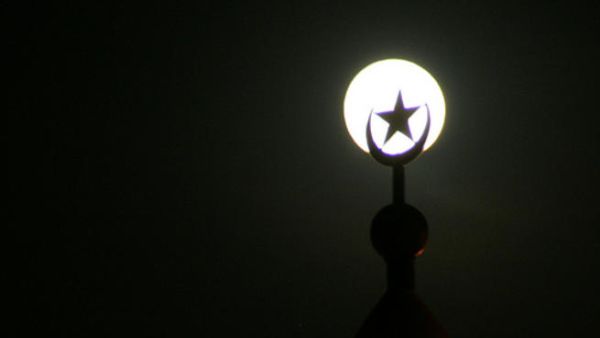It’s almost dusk; families gather together to break their fast. It’s a time when brothers and sisters in Islam seek blessings, goodness, obedience and religious learning. But most of all it’s a time when families make sure to break bread together no matter what the circumstances. This year, soaring food prices and an insecure economy are shaking those habits. Various consumer and media groups have observed a major food price surge since Ramadan began this week, with several items reaching alarming levels. Consumers told The Daily Star they were significantly cutting their consumption. Many poor families have removed fruits from their diets, they said, after that food group saw a price spike of more than 40 percent. Growing frustration with the rise in food prices, as well as hikes in the cost of restaurantmeals, was palpable among patrons who were recently breaking the fast in the neighborhood of Downtown Beirut.
Salma Wehbe, a Lebanese local, walks into the Downtown Karamna restaurant with her family while holding her little brother’s hand. It’s supposed to be a festive occasion but Salma is looking distraught. “I come here with my whole family, it’s not rational to pay almost LL400,000 for an iftar” she says. The Kayyali family, who live abroad, are happy about their decision to spend Ramadan in their homeland Lebanon, but still have some complaints. “Some restaurants take advantage of this month and everything becomes more expensive,” said a member of the family while lounging at a nargileh cafe in Nijmeh Square. In Jeddah, where the family lives, an average iftar meal costs around LL25,000, he said.
In keeping with the lunar calendar, the dates of Ramadan vary, moving backward by about 11 days each year. This year the onset of Ramadan fell on Aug. 1, mid-summer in Beirut. Some think that the heat is encouraging people to stay in air-conditioned homes, or even driving them to leave the country. “Due to the heat this summer, many fortunate families prefer to travel and spend Ramadan abroad,” says Fadi Nsouli, Manager of TGI Fridays’ Downtown branch, which is usually bustling with Gulf Arab tourists. This year, they’ve lowered the price of their Ramadan set menu to just LL20,000 in a bid to lure the tourists back.
“We can’t take advantage of people and raise our prices too much, we have to stay true to our name,” Ali Abd al-Wahed, manager of Karamna – an Arabic word for generosity. Karamna has LL40,500 per person set menus during Ramadan. One of these is specifically designed for Gulf nationals. Wahed motions toward a plate of dates wrapped in baked dough, a Khaleeji specialty eaten as dessert. Only four tables out of 10 in the restaurant are occupied during iftar time – and many of the customers are dressed in traditional Gulf garb. “The restaurant is empty. We sit here doing nothing all day,” said one waiter at another Downtown restaurant.
Many people told The Daily Star they were doing away with iftar outings altogether. They prefer to get a breath of fresh air after the meal, over a hookah and dessert. “Its more affordable to dine at home and then have some hookah with the family at a cafe later,” Wehbe explains. “Lebanese don’t want to spend that much for iftar. They would rather come after,” says James Romanos, a waiter at Citta’ Resto Cafe, a restaurant with international cuisine.
Some restaurants are raising prices of non-iftar items. “Wherever there’s hookah, people will come running no matter what the price is and we as managers know that,” Fares Ahmad, manager of the Petit Cafe in Rouche says. Petit Cafe offers a set menu for the month of Ramadan. Like Karamna, the set menu includes everything from soup to dessert at LL37,500 per person. “We haven’t increased our prices since last year, and if we do we’ll lose our regular customers,” says Ahmad.
Still there are some, like the Kayyalis, that aren’t deterred by the erratic pricing. “We live in Saudi Arabia but there’s nothing like Ramadan in Lebanon, It’s expensive but worth it.”







